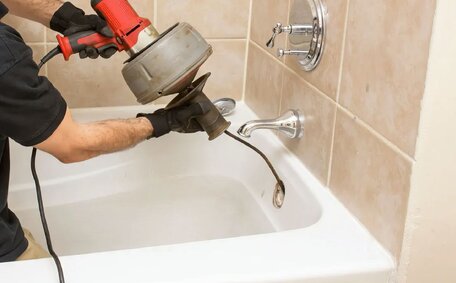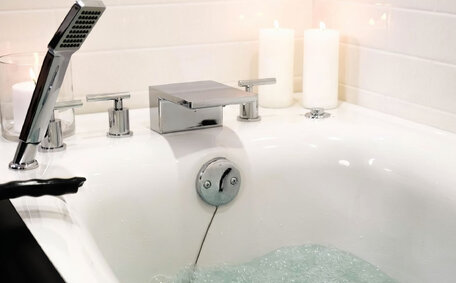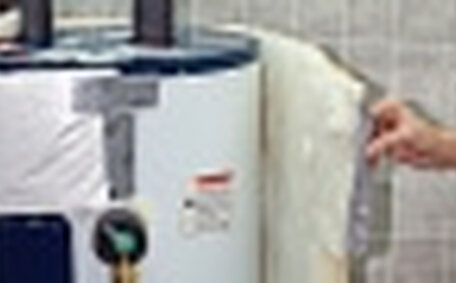Introduction to Testing for Gas Leaks
Ensuring gas safety at home through prompt gas leak detection is crucial for your family’s wellbeing. Gas leaks can arise suddenly and pose an invisible but significant danger.
The unique odour akin to rotten eggs, infused within natural gas, aids in prompt leak detection in your house. The distinct smell of rotten eggs, added to natural gas for safety, is a clear warning that warrants immediate action to identify and fix leaks.
Understanding how to tackle and address gas issues is critical for homeowners. Unaddressed, gas leaks can result in harmful gas accumulation and potential explosions.
The guide outlines how to spot leak warning signs, perform a soapy water test, utilise gas detectors, seek professional help, and take preventive actions. Equipped with this vital information, you’ll be able to keep your family safe and avoid catastrophic incidents.
Signs That Indicate a Possible Gas Leak
Detecting gas leaks is crucial, with several signs to watch for that signal potential risks to residential or commercial properties.
The strong 'rotten egg’ odour is a primary indicator of a natural gas leak—this scent often provides the first warning. If you notice this odour in your kitchen, potentially from a gas appliance or pipework, consider the possibility of a gas leak.
Other signs include:
- A hissing sound coming from your gas appliances or pipework
- Dirt blowing from a crack in the ground or accumulating around vents
- Bubbles rising in standing water puddles over the gas line
- Dead or dying plants in an otherwise green area
- Flames coming from the ground or burning above gas appliances
- Unexplained condensation inside your windows
- Elevated readings on your gas meter potentially indicate escaped gas
- Pilot light on appliances that frequently extinguish
If you observe these alarming signs, immediately contact emergency services, switch off the gas, evacuate, and call a plumbing emergency service for a comprehensive inspection.
Gas leaks present significant risks, including fire, explosion, and poisoning from carbon monoxide.
Using Your Senses to Detect Gas Leaks
While technology offers reliable ways to detect gas, your ears can act as effective initial alarms by catching peculiar noises. Your nose and ears can detect potential gas leaks if you know the signs.
You can smell gas, which is one of the fastest ways to detect its presence on your property, thanks to the pungent 'rotten egg’ odour added to natural gas. Detecting gas leaks using your sense of smell, even a faint whiff of this sulphurous odour in or around your dwelling, likely indicates a leak.
If you sense that distinctive odour and question what to do if you smell gas, immediate action is necessary.
However, it’s worth noting that people without a sense of smell cannot detect gas odours. You should never place full trust in your sense of smell alone to ascertain if a leak present. When gas such as methane leaks without an added odour, detecting it can become a challenge.
Listen carefully for hissing or whistling sounds near gas appliances, as these could signal a leak. A high-pitched squeal, particularly near your gas stove or hot water system, often signifies a leak.
Auditory and olfactory senses are helpful initial alerts, but they have limitations. Gas pipework in walls may emit no noticeable smells or sounds. Sensory checks should be supplemented with technical inspections using gas detectors.
Rely on electronic detectors and the expertise of a licensed gas fitter to accurately identify and mitigate hazards. Technological instruments and expert inspections are essential, as they offer accuracy beyond the capability of human senses for ensuring natural gas safety in your home.
Physical Signs of a Gas Leak
Physical symptoms caused by exposure to a gas leak in your home alert you to significant risks. Being aware of these signs and their health implications is vital for safety.
One common symptom, headaches, fatigue and dizziness, can cause gas poisoning to go unnoticed. Natural gas can reduce the blood’s oxygen levels, resulting in oxygen deprivation with these effects. Continued exposure from a gas leak can lead to flu-like nausea, vomiting and impaired coordination.
More severe symptoms like chest pain and breathing difficulties signal a serious health threat requiring swift medical help. Dismissing physical cues is unwise as a gas leak can instigate an array of symptoms from inhaling noxious gas, signalling any potential dangers.
Importantly, check your home’s upper levels as natural gas, being lighter than air, rises while leaking. Inspect higher levels of rooms meticulously for the presence gas accumulation might create, like a foggy white mist near the ceiling. This is where gas accumulates from unseen floor-level leaks.
Trust your senses to detect a leak, but if you suspect gas leak, verify any suspicions with professional equipment as your home’s safety may depend on it. Physical symptoms offer an early warning, but to properly detect a gas leak your home could be harbouring, consulting the experts is recommended to ensure safety before gas concentrations escalate.
Taking Safety Precautions When a Gas Leak is Suspected
If you suspect a gas leak, your priority should be immediate safety. Here’s what to do when you encounter a gas leak, along with some important precautions to take:
- Immediately evacuate the premises without using any gas appliances and then contact emergency services from a safe distance.
- Refrain from using electronics, including light switches, as they could ignite the gas and cause an explosion.
- Avoid lighting any matches or lighters to prevent igniting the gas.
- If it’s safe to proceed, turn off your gas at the main valve to prevent further leakage. Make it a point to know where to shut off your main valve beforehand.
- Do not re-enter the building until emergency responders confirm it is safe.
- For heightened safety, install gas detection equipment that alerts you to hazardous leaks.
- Schedule annual inspections by a licensed gas technician. They can find and fix minor leaks before they become hazardous.
- Should your appliances malfunction or you do smell gas, it’s imperative to contact a professional immediately. Never ignore warning signs.
A swift response is demanded when there’s a potential gas leak, so check for its existence carefully for your safety. Evacuation, avoiding ignition sources, shutting off the gas supply, and calling the fire department are crucial steps.
DIY Gas Leak Detection Methods
Engaging a professional gas technician is the safest course of action, there are some basic DIY methods you can use to test gas and check for minor gas leaks:
Soapy Water Test
This is one of the simplest ways to conduct a test for a gas issue:
- Shut down the gas supply and any associated appliances before testing.
- Mix a few drops of dish soap with water in a spray bottle to create a leak detecting solution if needed.
- Apply the soapy solution to connectors, valves, pipes, and joints to inspect for leaks.
- Look closely for any bubbles forming, which you can see as a clear sign of a leak. Bubbling indicates gas is escaping, signifying a gas leak present.
- Rinse off the soapy water and contact a professional as soon as possible if you detect any leaks.
For BBQ safety, conduct the leak test outside.
Gas Leak Detector Spray
Specialised leak detector spray solutions are available at hardware stores. Simply spray these onto areas you suspect may be leaking.
If gas is present, the liquid will bubble up. Follow all safety precautions as you would with the soapy water method.
While DIY leak tests are handy for minor problems, it’s essential to resolve larger or complex leak issues with qualified professionals as soon as possible. They wield high-quality detection equipment and possess the expertise required to fix gas leaks your home may harbor.
When to Call a Professional
While examining how to do gas leak checks for minor natural gas leaks, it’s crucial we’re going to contact a professional, licensed gas fitter in several situations:
- When a powerful gas odour or loud hissing sound emanates from appliances or gas lines.
- If DIY leak tests repeatedly indicate leaks that you cannot resolve yourself.
- If residents experience symptoms such as dizziness, nausea, breathing difficulties, or an unexplained surge in the gas bill.
- If gas appliances are malfunctioning, pilot lights are blowing out or you’re concerned about unusually high gas bills.
- If you see any visual signs of a leak like dirt blowing from the ground or dead dying plants around gas lines.
- For any leak where the location is unclear or hard to access safely yourself.
- If you have no gas detectors installed or are unable to purchase leak detection spray.
- After seismic events that may have loosened pipe connections.
- For full inspection and maintenance if your gas system is ageing.
At the first sign of a potentially dangerous or unresolved leak your local experts at Marrickville Plumbing are the ones to call. We have advanced leak detection equipment to pinpoint issues precisely. Our licenced professionals can perform gas leak repair swiftly, ensuring all is made safe and secure permanently.
Don’t take risks with do-it-yourself repairs when it comes to gas safety for your home. We’re available 24/7 to assess suspected leaks and conduct repairs to keep your family protected.
Gas Leak Repairs and Prevention
When a gas leak occurs, detecting and repairing it quickly is critical for safety. A licenced professional should handle any leaks that DIY methods cannot resolve. They have specialised equipment and expertise to properly identify leak locations and make permanent repairs.
Repairs can help by replacing corroded piping or joints, tightening loose fittings, and sealing small cracks or holes. More involved repairs may involve observing indicators such as red or yellow flags on appliances, potentially requiring partial pipe replacement or appliance servicing.
Annually maintain your gas appliances to check for wear and mitigate risks of leaks. Replace outdated cast iron or galvanised steel gas pipes with robust polyethylene plastic ones for enhanced durability. Installing protective pipe sleeves where lines pass through masonry can also prevent leaks.
Consider installing gas detectors connected to a central alarm system for round-the-clock leak monitoring. Detectors provide peace of mind by immediately alerting you to any dangerous gas buildup which radon gas can also cause.
Prevention is the best approach. With regular inspections and proactive measures to prevent gas system degradation, leaks can be avoided before they threaten safety.
Upgrade old cast iron or galvanised steel gas pipes to more durable polyethylene plastic pipitoring.
Conclusion: Gas Leak Safety
Gas leaks are a serious threat that require swift response. Trust your senses as initial informants, but always confirm any suspicions with a meticulous professional assessment and turn off gas appliances immediately if gas leaking is suspected. For minor issues, knowing how to fix a gas leak with DIY methods like the soapy water test may identify problems; call help if done carefully.
Nevertheless, upon the initial hint of a substantial leak or any hint that there’s gas exposure, Marrickville Plumbing will address the issues appropriately. For ongoing safety, we also provide annual servicing of gas appliances and can upgrade ageing pipe infrastructure. Take a proactive approach to prevent leaks before they endanger your family.
Do not dismiss the danger of gas leaks or embark on risky DIY repairs. As your local experts for over 10 years, Marrickville Plumbing make gas safety our highest priority. We’re always on call to quickly address any hazardous leaks and ensure the long-term reliable performance of your gas system.






